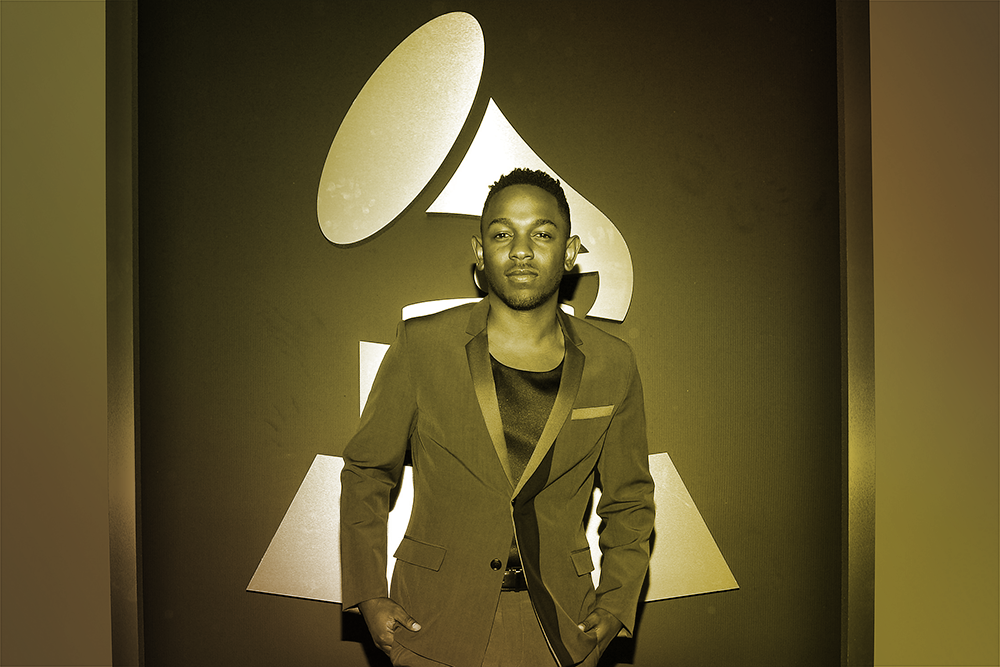Back in 2009, just as Kendrick Lamar began to gain notice on blogs such as 2dopeboyz.com, he offered this lyric on “I Am (Interlude),” from his self-titled EP: “See, y’all don’t understand me / My plan B is to win y’all hearts before I win a Grammy.”
Seven years later, the National Academy of Recording Arts and Sciences has showered Lamar with 11 nominations for his universally acclaimed To Pimp a Butterfly, including its most prestigious award, Album of the Year. These citations are nearly unprecedented; they’re only bested by Michael Jackson’s 12 nominations for Thriller at the 1984 awards. On January 25, the industry group debuted a two-minute clip, “Witness Greatness,” that depicts Compton residents reciting the words to “Alright,” arguably the most important song of 2015 and an unofficial anthem for the #BlackLivesMatter movement. The TV ad for the Grammys broadcast on Monday, February 15 is also part of what has been termed a “lobbying campaign” by Lamar to secure him the music industry’s biggest honor.
Winning Album of the Year for Butterfly would make him the first hip-hop artist since OutKast in 2004 to claim the Grammys’ top trophy (and the third hip-hop artist to win altogether). Yet his masterwork has already been cited as the best album of the year from virtually every publication on the Internet, including this one. Butterfly launched a thinkpiece cottage industry, although radio programmers remained immune to its linguistic complexities and, undoubtedly, inflammatory “Alright” lyrics like “We hate po-po.” After what it’s already achieved, Grammy recognition would be a fantastic but less essential laurel. And he was already awarded statues for both Best Rap Song and Best Rap Performance for his single “i” in 2015.
Meanwhile, the Grammys have a longstanding reputation for ignoring pop critical consensus. Beyoncé may have changed the music industry when she dropped her landmark self-titled album without warning, inspiring many major artists to, in her wake, “pull a Beyoncé.” But that didn’t keep Beck from winning the 2015 trophy for his satisfying but comparatively unadventurous Morning Phase. In 2008, jazz luminary Herbie Hancock won, earning a virtual lifetime achievement award for his modest River: The Jonie Letters, and sidelining far more relevant classics like Amy Winehouse’s incandescent Back to Black and Kanye West’s trendsetting Graduation. And what better represented 2001 to you: Eminem’s The Marshall Mathers LP, Radiohead’s Kid A… or Steely Dan’s Two Against Nature?
Two years ago, Lamar’s epochal good kid, m.A.A.d city lost to Daft Punk’s worthy if arguably less influential Random Access Memories. What we remember about that 2014 ceremony, however, is how Macklemore & Ryan Lewis’ polarizing The Heist claimed Rap Album of the Year, and then how Macklemore embarked on a nauseating apology tour: posting on Instagram a private text to Lamar acknowledging that the latter deserved to win, and then giving several interviews reiterating his self-sanctifying point. Lamar won’t have to worry about that this year, if only because he doesn’t have to compete with white rappers. (Pencil in Macklemore & Ryan Lewis’ upcoming This Unruly Mess I Made for 2017 now.) It’s all but assured that he’ll win that category unless one of his competitors pull off a massive upset, with J. Cole’s meandering, soul-searching 2014 Forest Hills Drive and Dr. Dre’s bombastic Compton as the most likely candidates.
The Grammys earn less respect than the Oscars, the Tonys, or the Emmys, but just because musicians, label executives, and innumerable bloviators tweeting in all caps complain about its decisions doesn’t mean they’re irrelevant. T.I. was right when he complained on “You Know What It Is,” “Had the album of the year, nigga, Grammy or not” after the 2007 ceremony, where his irrepressible coronation King was defeated by the middlebrow Southern pop-rap of Ludacris’ Release Therapy. But knowing the truth isn’t as satisfactory as receiving one’s just awards.
Rap culture is predicated on subversion. It’s not only being able to rhyme about struggling to survive in the trap by pushing weight, and selling over a million copies/streams/downloads of your boasts, , to boot. As Jay Z — whom Lamar depicted as Michael Jordan to his Kobe Bryant on the artwork for his “Bitch Don’t Kill My Vibe” remix — once said, “Change the game.” Leaving the court altogether in favor of underground streetball glory is a less appealing option.
Lamar understands this strategy. It’s why he followed up good kid, m.A.A.d city, which spawned three Top 40 singles, with an intricately written magnum opus that required a Ph.D in black liberation theology to unpack and had no obvious radio jams. (“Alright” may be up for Song of the Year, but it stalled at No. 81 on the Billboard Hot 100 charts.) By giving his audience a more difficult work to process, he aims to show that rap artists can make albums as commercially uncompromising as Arcade Fire’s The Suburbs, which nevertheless claimed Album of the Year in 2010 (and deservingly, no matter what Steve Stoute says).
Whether Lamar succeeds at the Grammys remains to be seen. Already there are misgivings that Chris Stapleton may be primed to ascend to music industry royalty with his surprisingly durable country-rock breakout Traveler; he, along with Alabama Shakes’ Sound & Color and perennial favorite Taylor Swift’s 1989, may be tough competition. (It seems unlikely that this year will belong to the Weeknd’s Beauty Behind the Madness; he’s a more viable candidate for Record and Song of the Year.) Unlike previous years where the Grammys’ intrinsic cultural conservatism was on full display, they’ve selected a slate of candidates deserving of the honor. However, the specter of widespread viral protest blaming the eventual winner for some kind of racial, ageist, or rockist bias looms ominously, even though Lamar appears on the video version of Swift’s “Bad Blood,” a black singer leads Alabama Shakes, and all of the nominees are under 40.
Luckily, best-selling rap artists like Lamar are generally more amenable to working with the Grammys than, say, Pearl Jam in their prime. Concurrently, the organization needs the support of a critically and commercially viable rap star like Lamar, whose Butterfly is technically platinum-certified, prompted a visit with President Obama, and is already being taught in classrooms. At the very least, the Grammys need him to perform on this year’s telecast for ratings purposes. Hopefully he’ll assemble a performance as incendiary as his BET appearance, where he rapped while standing on top of a police car.
https://youtube.com/watch?v=7n1bwh_vglA





